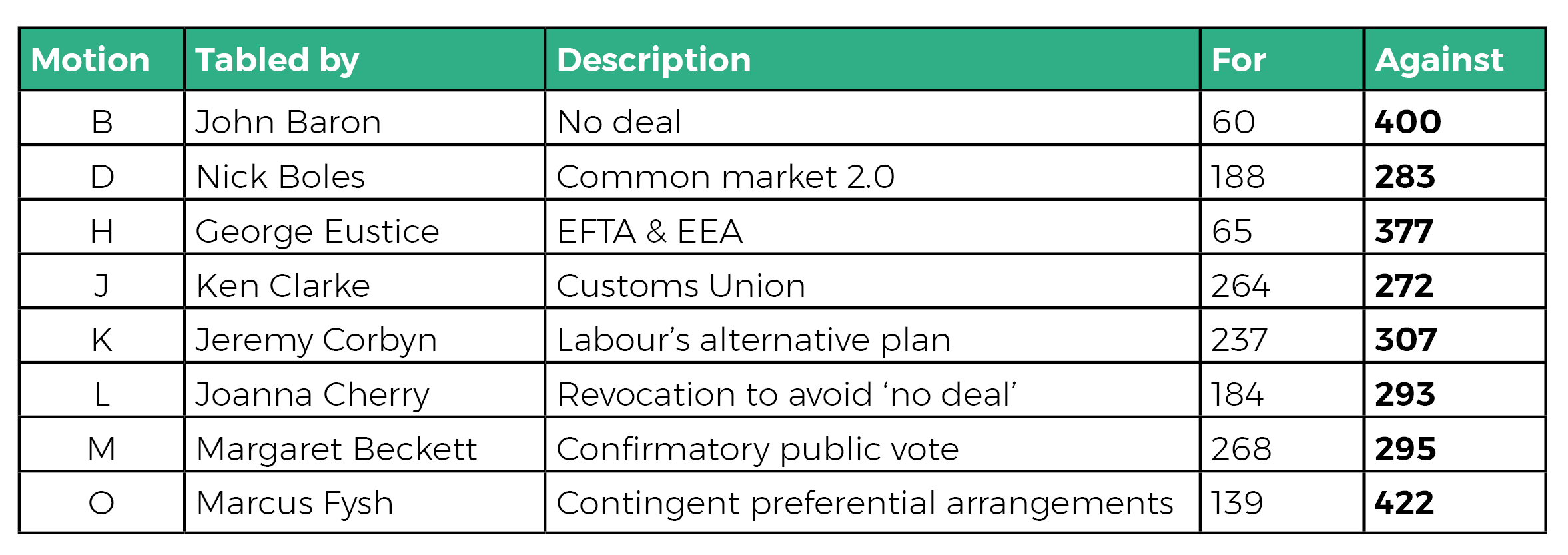Today is 29 March 2019. Until two days ago, today is the day when the UK was due to leave the European Union. But things have changed. This blog post explains why this is the case, and takes a look at this week’s Brexit goings-on in Westminster and Wales.
A whirlwind of a week at Westminster
To kick off the parliamentary week, on Monday the Prime Minister made a statement to the House of Commons on last week’s decision of the European Council to formally endorse the so-called Strasbourg agreement, as well as to allow a short extension to the Article 50 process. In doing so, she emphasised the Council’s position on the Withdrawal Agreement, saying that ‘however the House decides to proceed this week, everyone should be absolutely clear that changing the Withdrawal Agreement is simply not an option.’
The Prime Minister said that she continues to believe that the right path forward is for the UK to leave the EU with a deal as soon as possible—that date now being 22 May. She also stated her belief that there was not sufficient support in the House at that time to bring back the deal for a third meaningful vote, adding that she would continue to have discussions with colleagues across political parties to build support. If this does not happen, she said that she would have to seek a longer extension, which would entail the UK having to hold European elections.
Following the Prime Minister’s statement, there was a vote on the motion that the Government was required to move under the EU Withdrawal Act 2018 after Parliament rejected its deal for a second time on 12 March. This motion ‘takes note’ of the statement that sets out the Government's plan to ask the EU for an extension to Article 50. Following the debate, MPs voted in favour of an amendment to the motion by Oliver Letwin (329 votes to 302). The amendment adds a clause to the end of the motion to allow Parliament to take control of Commons business the following Wednesday and hold a series of so-called ‘indicative votes’ on alternative ways forward. In advance of the vote, the Prime Minister said:
I must confess that I am sceptical about such a process of indicative votes. When we have tried this kind of thing in the past, it has produced contradictory outcomes or no outcome at all. There is a further risk when it comes to Brexit, as the UK is only one half of the equation and the votes could lead to an outcome that is unnegotiable with the EU.
Those indicative votes took place on Wednesday. Eight options were put forward, however each one was rejected by MPs as follows:
While all this was going on, it was also reported on Wednesday that the Prime Minister offered to stand down if the Withdrawal Agreement, previously rejected twice, is accepted. Speaking at the backbench 1922 Committee, the Prime Minister acknowledged that she is prepared to leave her role earlier than intended so as not to stand in the way of the second phase of Brexit.
Following the result of the indicative votes, Speaker John Bercow confirmed that further debate will take place on Monday 1 April in order to shortlist available options and consider the most popular.
Changing Brexit day
Also on Wednesday, both houses of Parliament considered the European Union (Withdrawal) Act 2018 (Exit Day) (Amendment) Regulations 2019. This statutory instrument (SI) amends the definition of ‘exit day’ in the European Union (Withdrawal) Act 2018, which was previously 29 March 2019. Following a request from the UK Government, an extension was agreed by the European Council on 22 March. ‘Exit day’ will now either be 11pm on 22May 2019 (if the Prime Minister’s withdrawal agreement is approved by the House of Commons by the end of the day today) or 11pm on 12 April 2019 (if it is not). The regulations were approved by the House of Commons and House of Lords.
Brexit activity closer to home
In the External Affairs Committee on 25 March, the First Minister answered questions on topics such as the latest Brexit negotiations, how the Welsh Government is preparing for Brexit, legislation and intergovernmental matters. These are the main areas that the First Minister discussed:
- In terms of the next steps, the First Minster reiterated his view that the House of Commons should now decide whether to renegotiate the Withdrawal Agreement and Political Declaration or hold another referendum. He said that remaining in the EU is still the best option for Wales, but confirmed that the Welsh Government respects the result of 2016 referendum.
- In relation to intergovernmental relations after Brexit, the First Minister referred to the ongoing review, but said that this work had not taken a priority since September, as both UK and Welsh Government have been preparing for a ‘no deal’ Brexit.
- When asked about Brexit legislation, the First Minister said that there is a ‘moving, day-by-day analysis of how different outcomes would lead to different sorts of legislative needs’.
- When asked if he would recall the Assembly to ensure that there is an opportunity to scrutinise a Withdrawal Agreement Bill—the legislation needed to implement the Withdrawal Agreement in UK law—he said that he would be having conversations with the Llywydd in relation to the 12 April cut-off date.
- Members also asked about the Shared Prosperity Fund and the letter that the Committee had received from the Secretary of State for Wales. In response, the First Minister said that the Secretary of State’s response was ‘deeply unhelpful’ as his suggestion about allowing local authorities to make spending decisions in relation to the fund would mean that the Assembly would be ‘bypassed’.
Outside of the committee room, in Plenary on 26 March, David Rees asked an Emergency Question about the Government’s position following the European Council’s decision on 21 March.
In response, Counsel General and Brexit Minister Jeremy Miles said that it is ‘some comfort’ that the EU 27 have given a narrow window to avoid a ‘no deal’ Brexit. He welcomed the process of indicative votes in Parliament, adding that the Prime Minister must ‘abandon her disastrous red lines and listen.’
When asked about the possibility of second referendum, Jeremy Miles said that a referendum is one of two ways of responding to the current situation:
We have been clear that if a deal is available that reflects the principles in 'Securing Wales' Future'—one of close partnership and alignment in the future—that is the way forward that we advocate, and in the absence of that, then another referendum will be required in order to take us forward.
What’s happening today?
MPs will vote on another Brexit motion this afternoon. This is not the third ‘meaningful vote’, as this motion only asks MPs to agree the Withdrawal Agreement, and not the Political Declaration which sets out the future relationship. If MPs agree the motion, the UK Government says the UK will be able to obtain an extension until 22 May. If not, Brexit day will be 12 April, with a further set of indicative votes on the way forward for Brexit on Monday.
Article by Peter Hill, Senedd Research, National Assembly for Wales







